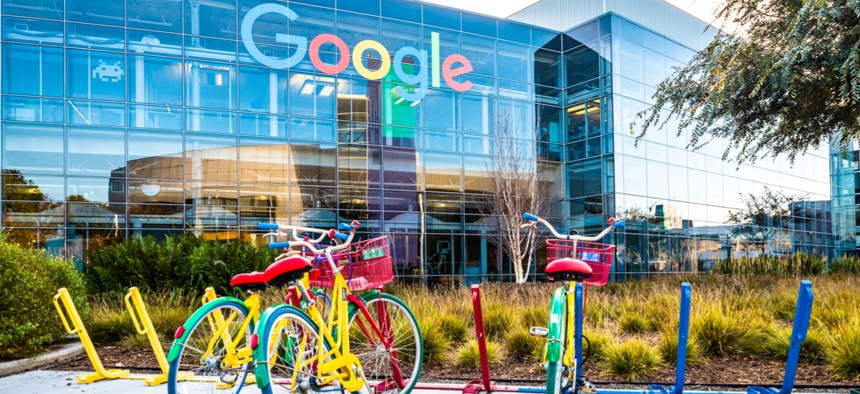A Former Google Engineer Explains How Creative Freedom Can Turn People Into Entitled Jerks

Uladzik Kryhin/Shutterstock.com
Most workers crave autonomy. But it can have a downside.
For a certain type of worker, Google sounds like paradise. The company offers on-site gyms, generous 401(k) matches, cafeteria trolleys stocked with chai tea and mango lassis, and even high-tech Japanese toilets. But its most attractive benefit may be the gift of personal autonomy.
As one former Google employee tells it in an email posted on the economics blog Marginal Revolution, during the 10 years that he worked at the Silicon Valley giant, Google granted engineers nearly unlimited creative freedom. He writes:
The official mantra was, “hire the smartest people and they’ll figure out the right thing to do.” People were generally allowed to sign up for any project that interested them (there was a database where engineers could literally add your name to a project that interested you) … Almost anything would be considered as a new project unless it was considered to be “not ambitious enough.”
This freedom made Google a deeply attractive—and inspiring—place to work, according to the anonymouos author. Recruiters lured potential hires with the promise that they could work on “anything they wanted to.” But this level of freedom had some surprising downsides for the company, too.
The appeal of autonomy
Most workers crave autonomy. People who have a sense of control over their work report higher levels of job satisfaction, which means less stress, less turnover, and more productivity and engagement.
But as the Google email reveals, when employees know they can work on whatever they want, they’re more likely to neglect the boring, everyday stuff. The email’s author notes, “infrastructure projects and unglamorous projects went wanting for people to work on them.” After all, if you have the chance to work on longevity research or self-driving cars, who’s going to opt to fix search-engine bugs?
Another issue is what might be called If You Give a Mouse a Cookiesyndrome. In the classic children’s book, a mouse happily receives a cookie—and proceeds to request a glass of milk, a straw to drink from, a mirror to check for his milk mustache, and so on.
Similarly, employees with total creative freedom can wind up feeling like they’re each the star of their own show—which can lead to somewhat ridiculous displays of entitlement. The former Google employee recalls:
The level of entitlement displayed around things like which treats were provided at the microkitchens was…intense. (Later, there was a tragicomic story of when they changed bus schedules so that people couldn’t exploit the kitchens by getting meals for themselves [and family…seen that with my own eyes!] “to go” and take them home with them on the Google Bus — someone actually complained in a company meeting that the new schedules…meant they couldn’t get their meals to go. And they changed the bus schedule back, even though their intent was to reduce the abuse of the free food.)
Employees squabbling over free food and bus schedules may sound trivial. But the tale illustrates a larger issue at Google, according to the author: Over time, workers became less focused on the company’s collective mission, and more preoccupied with their individual advancement and rewards. In other words, the company culture got selfish. (Quartz reached out to Google for comment on this characterization, and will update the story if Google responds.)
Finding a balance
While creative freedom can come at a cost, it’s also true that employees are more likely to be innovative and enthusiastic when they know that they’re in charge of their own destinies. For most companies, the trick is to give employees just the right amount of autonomy: Enough so they feel motivated and creative, but not so much that they forget this is a job with responsibilities, which sometimes entails doing stuff you’d rather not.
One useful insight on striking this balance comes from Barry Schwartz, a social psychologist at Swarthmore College and the author of Why We Work. Schwartz is a big advocate for the importance of autonomy in the workplace. Writing for the New York Times, he recommends “giving employees more of a say in how they do their jobs” and “making sure we offer them opportunities to learn and grow.”
But Schwartz argues that the other crucial component in job satisfaction is helping employees to understand the social purpose of their work—thereby shedding light on the ways in which even tedious, humdrum tasks contribute to a greater collective good. “We need to emphasize the ways in which an employee’s work makes other people’s lives at least a little bit better,” Schwartz writes in the Times.
Highlighting the social purpose of a job can also serve as a check on impulses toward selfishness and entitlement. People are more willing to volunteer for a boring—but necessary—project if they understand the broader social ramifications of their work. (Hopefully, they’re also more likely to be aware of the pettiness of complaining about free food.)
Ultimately, the anonymous Google worker’s email highlights a tension faced by many companies that strive to produce innovative, groundbreaking work. There’s no doubt that workers are happier when they have more autonomy. The trouble starts when they begin to mistake their individual happiness for the company’s end goal.





